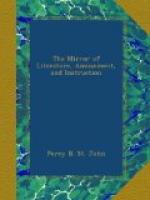We now come to the consideration of air. Pure air is as necessary to existence as good and wholesome food; perhaps more so; for our food has to undergo a very elaborate change before it is introduced into the mass of circulating blood, while the air is received at once into the lungs, and comes into immediate contact with the blood in that important organ. The effect of the air upon the blood is this: by thrusting out as it were, all the noxious properties which it has collected in its passage through the body, it endues it with the peculiar property of vitality, that is, it enables it to build up, repair, and excite the different functions and organs of the body. If therefore this air, which we inhale every instant, be not pure, the whole mass of blood is very soon contaminated, and the frame, in some part or other speedily experiences the bad effects. This will explain to us the almost miraculous benefits which are obtained by change of air, as well as the decided advantages of a free and copious ventilation. The prejudices against a free circulation of air, especially in the sick chamber, are productive of great evil. The rule as regards this is plain and simple: admit as much fresh air as you can; provided it does not blow in upon you in a stream, and provided you are not in a state of profuse perspiration at the time; for in accordance with the Spanish proverb—
“If the wind blows on you through
a hole
Make your will, and take care of your
soul.”
but if the whole of the body be exposed at once to a cold atmosphere, no bad consequences need be anticipated.
A great deal has been said about the necessary quantity of sleep; that is, how long one ought to indulge in sleeping. This question, like many others, cannot be reduced to mathematical precision; for much must depend upon habit, constitution, and the nature and duration of our occupations. A person in good health, whose mental and physical occupations are not particularly laborious, will find seven or eight hours’ sleep quite sufficient to refresh his frame. Those whose constitutions are debilitated, or whose occupations are studious or laborious, require rather more; but the best rule in all eases is to sleep till you are refreshed, and then get up. If you feel inclined for a snug nap after dinner, indulge in it; but do not let it exceed half an hour; if you do, you will be dull and uncomfortable afterwards, instead of brisk and lively.
In sleeping, as in eating and drinking, we must consult our habits and feelings, which are excellent monitors. What says the poet?—
“Preach not to me your musty rules,
Ye drones, that mused in idle
cell,
The heart is wiser than the schools,
The senses always reason well.”




